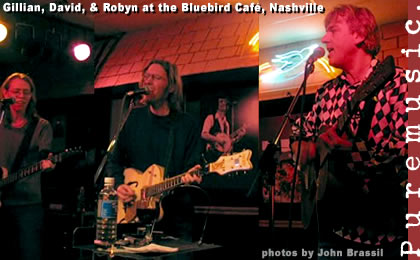
A Conversation with Robyn Hitchcock (continued)
PM: We're very big, as I might have mentioned, on Gillian and David. [Check out the Gillian Welch profile in our previous issue if you missed it.] So anything anecdotal about your time with them is interesting to us. What did you find them to be like personally and professionally?
RH: There's not a big gap between the personal and the professional. I think they're very saturated in music--to the point where they listen to it so much that they just sort of also really can't help playing it or singing it. I mean, they're driving along in the car and they'll suddenly burst into a two-part harmony, not because they're showing off, but because they just want to make a point about something. I've been on the phone, and one of them is explaining something to me, and then they'll just sort of take up a banjo or a guitar and croon into the receiver. It’s lovely, actually. It's just very important to them.
And I think musicians--they have long antennae. They’re not always wonderful people, but they're very attuned to something. And those two are very receptive. They've made their name in a particular field, but I think part of the reason that they have been so successful is because they're not from that field. They've got that old-time kind of patina to their act, but actually, in a way, they're 80s indie rock people because--
PM: Sure.
RH: --they’re also people that grew up listening to R.E.M. and the Replacements and the Pixies and, indeed, me.
PM: And indeed, Robyn Hitchcock.
RH: Yeah. Well, and when I saw them in concert, I mean, I'd heard a few of their records and really liked them--I don't listen to much music these days. I kind of just got oversaturated about ten years ago and just couldn't really take anything else in. But I liked them. And they went into a version of "Manic Depression," and I thought, ahh, of course, they're not just old timers, they're actually fifteen years younger than me.
PM: That’s amazing, of all the Hendrix tunes…
RH: Well, it actually worked very well… I was also interested because I do an acoustic version of "The Wind Cries Mary" and so I thought we've both done mournful acoustic versions of Hendrix songs, and I thought at that moment, "God, I wonder if they've heard my stuff," and, sure enough, they had. I mean, I signed David's guitar at an in-store in Boston in 1989. But the connection aside, I like them--they were great, and they are great, or they were the last time I saw them.
PM: [laughs]
RH: I guess they're pretty successful, but they don't seem to put on airs. They're very--
PM: They're just music-centric, that’s cool.
RH: They're musically focused, but I think they're also able to take things in. They listen. I mean, David is much chattier than Gillian. It's not that Gillian is quiet, but Dave just sort of--thoughts come spilling out of him all the time, and then he kind of edits it later. He's always trying something out. Gil, I think, forms ideas quietly inside herself and then voices them. But they first listen. And I think it's hard for people in America to listen. America is full of people who output, which is why therapy is so popular. You have to pay someone to listen to you for half an hour. I mean, it's catching on in Britain as well.
PM: Is it?
RH: The art of actually absorbing things around you is dying. I think the big symbol for our era will actually not be the TV, but the headphones--everything that's happened in the last twenty years--and the IPod is the latest version of that.
PM: Right.
RH: Especially now that everybody talks on cell phones in public. If you want to tune that stuff out, then you just put your IPod on, or your disc player, or whatever. I can foresee a whole world of people walking past you who are either talking to someone they can't see or listening to someone who isn't there.
PM: [laughs]
RH: And if you were from a primitive society, you might think that they were praying. I remember first thinking that when I saw a man on a cell phone on a train station platform about fifteen years ago. They were quite big in those days. But I just saw this man pacing up and down an English country platform, talking into this sort of brick thing, and I thought "it looks like he's praying..." I mean, if you were from the Kalahari or something, you might be confused. You might think that he was praying while he's walking. I don't know, or that he was mad.
That was the other point that I was making in the "Television" song, really. It's that whole thing of being involved with something that's absent, and that cannot--people talk about it being "interactive," but it's not, really. You're sort of worshipping at the altar of something that has no idea that you are there. And that’s probably always been around in some way, but it's mad. I think TV is very linked to religion.
PM: [laughs]
RH: So anyway, all that is answering a question you asked half an hour ago...
PM: [laughs] continue
print (pdf) listen to clips puremusic home